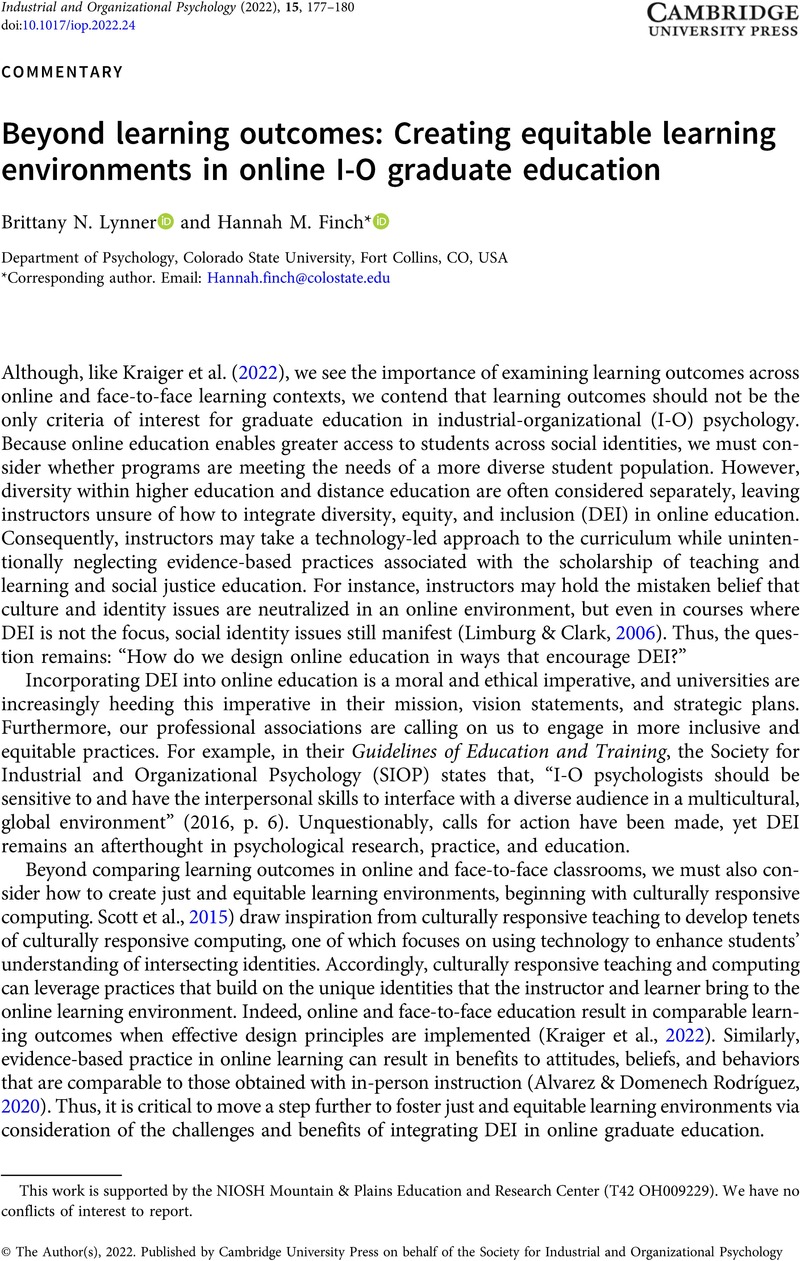No CrossRef data available.
Article contents
Beyond learning outcomes: Creating equitable learning environments in online I-O graduate education
Published online by Cambridge University Press: 26 May 2022
Abstract
An abstract is not available for this content so a preview has been provided. Please use the Get access link above for information on how to access this content.

- Type
- Commentaries
- Information
- Copyright
- © The Author(s), 2022. Published by Cambridge University Press on behalf of the Society for Industrial and Organizational Psychology
Footnotes
This work is supported by the NIOSH Mountain & Plains Education and Research Center (T42 OH009229). We have no conflicts of interest to report.
References
Alvarez, M. D. L. C., & Domenech Rodríguez, M. M. (2020). Cultural competence shifts in multicultural psychology: Online versus face-to-face. Translational Issues in Psychological Science, 6(2), 160–174.CrossRefGoogle Scholar
Appert, L., Bean, C. S., Irvin, A., Jungels, A. M., Klaf, S., & Phillipson, M. (2017). Guide for inclusive teaching at Columbia. Center for Teaching and Learning. https://ctl.columbia.edu/resources-and-technology/resources/inclusive-teaching-guide/
Google Scholar
Fox, O. H. (2005). Diversity in online teaching: When culture and online education conflict. Home Health Care Management & Practice, 17(4), 342–345.CrossRefGoogle Scholar
Goold, A., Craig, A., & Coldwell, J. (2007). Accommodating culture and cultural diversity in online teaching. Australasian Journal of Educational Technology, 23(4), 490–507.CrossRefGoogle Scholar
Gunawardena, C. N., & LaPointe, D. (2008). Social and cultural diversity in distance education. In Evans, T., Haughey, M., & Murphy, D. (Eds.), International handbook of distance education (pp. 51–70). Emerald.Google Scholar
Hannon, J., & D'Netto, B. (2007). Cultural diversity online: Student engagement with learning technologies. International Journal of Educational Management, 21(5), 418–432.
Google Scholar
Kraiger, K., Fisher, S., Grossman, R., Mills, M. J., & Sitzmann, T. (2022). Online I-O graduate education: Where are we and where should we go? Industrial and Organizational Psychology: Perspectives on Science and Practice, 15(2), 151–171.Google Scholar
Kumi-Yeboah, A., Dogbey, J., Yuan, G., & Smith, P. (2020). Cultural diversity in online education: An exploration of instructors’ perceptions and challenges. Teachers College Record, 122(7), 1–46.CrossRefGoogle Scholar
Latchem, C. (2005). Towards borderless virtual learning in higher education. In Carr-Chellman, A. A. (Ed.), Global perspectives on e-learning: Rhetoric and reality (pp. 179–198). Sage Publications.CrossRefGoogle Scholar
Lewis Grant, K. S., & Lee, V. J. (2014). Wrestling with issues of diversity in online courses. Qualitative Report, 19(12), 1–25.Google Scholar
Limburg, F., & Clark, C. (2006). Diversity initiatives in higher education: Teaching multicultural education online. Multicultural Education, 13(3), 49–55.Google Scholar
Motteram, G., & Forrester, G. (2005). Becoming an online distance learner: What can be learned from students’ experiences of induction to distance programmes? Distance Education, 26(3), 281–298.CrossRefGoogle Scholar
Rhodes, M., Cleary, A., & DeLosh, E. (2020). A guide to effective studying and learning: Practical strategies from the science of learning. Oxford University Press.Google Scholar
Scott, K. A., Sheridan, K. A., & Clark, K. (2015). Culturally responsive computing: A theory revisited. Learning, Media, and Technology, 40(4), 412–436.CrossRefGoogle Scholar
Tajfel, H., & Turner, J. C. (1986). The social identity theory of intergroup behavior. In Worchel, S. & Austin, W. G. (Eds.), Psychology of intergroup relations (2nd ed., Chapter 1, pp. 7–24). Chicago: Nelson-Hall.Google Scholar


